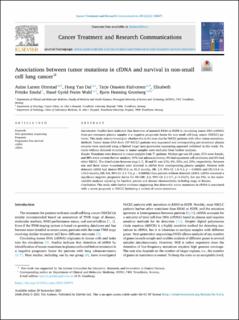| dc.description.abstract | Introduction: Studies have indicated that detection of mutated KRAS or EGFR in circulating tumor DNA (ctDNA) from pre-treatment plasma samples is a negative prognostic factor for non-small cell lung cancer (NSCLC) pa-tients. This study aims to investigate whether this is the case also for NSCLC patients with other tumor mutations. Methods: Tumor tissue DNA from 107 NSCLC patients was sequenced and corresponding pre-treatment plasma samples were analyzed using a limited target next-generation sequencing approach validated in this study. Pa-tients without detected mutations in tumor samples were excluded from further analyses. Results: Mutations were detected in tumor samples from 71 patients. Median age was 68 years, 51% were female, and 88% were current/former smokers, 91% had adenocarcinoma, 4% had squamous cell carcinoma and 6% had other NSCLC. The distribution between stage I, II, III and IV was 33%, 8%, 30%, and 29%, respectively. Between one and three tumor mutation(s) were detected in ctDNA from corresponding plasma samples. Patients with detected ctDNA had shorter PFS (9.6 vs. 41.3 months, HR: 2.9, 95% CI: 1.6–5.2, p =0.0003) and OS (13.6 vs. 115.0 months, HR: 4.0, 95% CI: 2.1–7.6, p =0.00002) than patients without detected ctDNA. ctDNA remained a significant negative prognostic factor for OS (HR: 2.5, 95% CI: 1.1-5.7, p=0.0327), but not PFS, in the multi-variable analyses adjusting for baseline patient and disease characteristics including stage of disease. Conclusions: This study adds further evidence supporting that detectable tumor mutations in cfDNA is associated with a worse prognosis in NSCLC harboring a variety of tumor mutations. | en_US |

